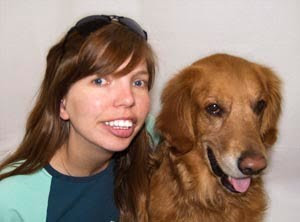How to choose a vet
Apollo has been slowing down lately, to the point where he does not want to run when we play. If we walk, though, he can chug along for miles without a problem. Although he is more reluctant to exert himself the following day. When I realized that he was definitely slowing down, I hunted around for a vet that I would feel comfortable with. Very frustrating - 3 out of 6 vets I called hung up on me and the relay service. One told me to call back later and hung up promptly. I called back and got the same message. Only two took the time to talk to me, and I chose the one that took the time to ask me a few questions about Apollo.
Verdict? His poor breeding is rearing its ugly head. He is showing signs of hip dysplasia problems in his left hip, and possibly in his right too. The vet felt a sort of a "crunching" (her word) sensation when she appreciated the left hip; she felt that the right hip would eventually show signs. The bad news is, Apollo may eventually need surgery to repair this. It's very expensive - ranges from $1500 to $4000, depending on the vet and on what needs to be done.
The good news is: it isn't bad enough to warrant a surgery - yet. We are going to treat him with a steady dose of antiflammatory for a couple weeks to see how he does on it. If it doesn't help, we'll try a different, stronger medicine.
When I'm looking for a new vet and don't know many people that could make a recommendation, it's a smart thing to ask many questions. Ask about their office exam rates, how much office visits cost, what their policy is on spaying/neutering, are they pill-happy? (although I don't recommend posing the question like that), what kind of food do they recommend for animals that needs a diet? Etc.
If they push Science Diet, unless they have GLOWING references in every other way, I won't consider them at all. Science Diet is one of the worst foods for animals, nutritionally-wise, out on the market. Its main ingredients (usually the first few ingredients listed on the bag) are: Corn meal, chicken byproducts and animal fat. The vet we went to primarily sells Royal Canin - a somewhat better quality pet food.
When I arrive at the office, I take note of the reception area. Is it clean? Does the receptionist know who I am? Did she anticipate my arrival? I was very surprised when the receptionist today said, when I came in, "Ms. Carrigan, welcome to...My name is (something something)." Most of the time, they don't. I was impressed.
In the exam room, I study how the tech interacts with Apollo and me. Of course, there will be a few techs that are uncomfortable with a specific species - I, who once considered being a vet, don't like birds, for example. But for most part, they should be comfortable and interact well with them.
While I understand that vets (and doctors) are rushed, I think it's important that they make me feel I'm being listened to, that I - or my pet - are cared about. If they are cursory and abrupt...I won't go back. Both the tech and the vet listened, asked me questions, and performed most of the exam in front of me. They did take Apollo into the back to draw some blood - I don't like that. Next time I'll ask they do it with me there; it doesn't make me squeamish.
In all, it was an excellent experience even though their rates are a little higher than the other local offices. We'll definitely be going back.




1 Comments (Click here to comment):
Poor Apollo, I hope the medication provides him some relief. Its a bit distressing to watch our canine friends get older. We have a
Jack Russell who's almost 14 years old and has congestive heart failure.
I agree with your ideas about vets - fortunately we have a local vet who is a real gem.
Good luck to you and Apollo.
Post a Comment